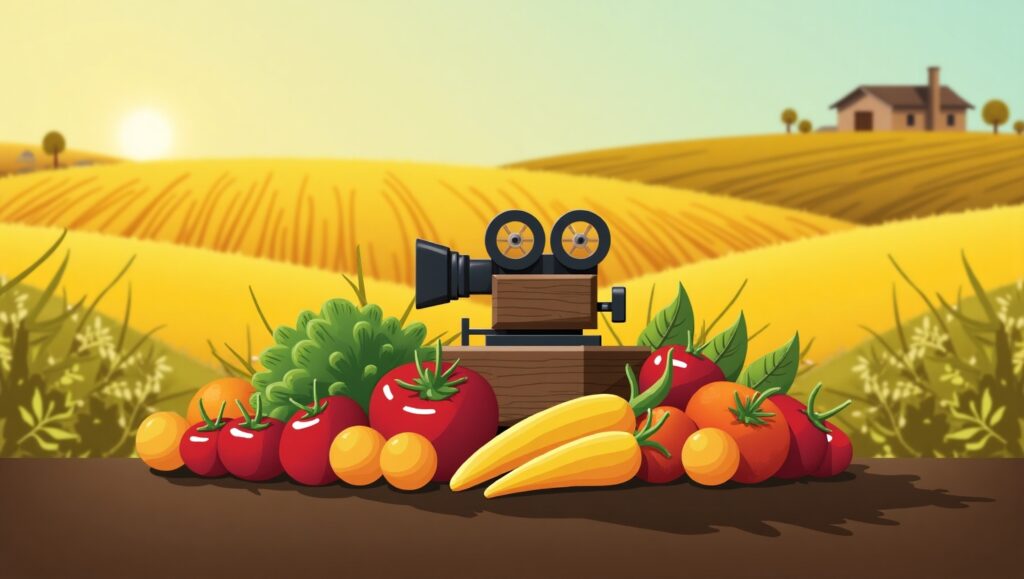From Field to Screen: Films Celebrating Sustainable Agriculture
This article explores the representation of sustainable agriculture in cinema.

The research focuses on how films raise awareness about ecological farming practices, rural life, and food security.
Sustainable agriculture is an essential response to global environmental concerns, and cinema has played a crucial role in promoting awareness.
Documentaries and fictional narratives alike showcase the challenges and triumphs of sustainable farming.
This article examines films that depict sustainable agriculture, analyzing their narratives, cinematographic techniques, and social impacts.
- Environmental consciousness has increased due to films highlighting the consequences of industrial farming.
- The role of storytelling in cinema helps humanize the struggles and successes of sustainable agriculture.
The cinematic portrayal of agriculture often intertwines with discussions on food security, climate change, and ethical consumption.
Sustainable farming practices, such as permaculture and regenerative agriculture, are frequently highlighted as solutions to ecological degradation.
- Viewers are introduced to alternative farming methods that counteract industrialized agriculture.
- Cinema acts as an educational tool, influencing policies and consumer behavior.
Filmmakers employ various techniques, from personal narratives to breathtaking cinematography, to captivate audiences and foster awareness.
By portraying the lives of farmers and food producers, these films not only entertain but also educate.
- The emotional connection formed with audiences can inspire real-world action and advocacy.
- Cinematic techniques like slow-motion visuals and drone shots emphasize the beauty of sustainable landscapes.
+ The Four Elements and Sustainability: Mythology and Natural Balance
The Role of Cinema in Promoting Sustainable Agriculture

Cinema influences public opinion and policy.
According to Nichols (2017), documentary films shape societal perspectives by presenting compelling narratives that evoke emotional and intellectual responses.
Agricultural films educate viewers about sustainability, ethical food production, and environmental stewardship.
- Sustainable agriculture films have contributed to increasing consumer awareness of food sourcing.
- Several of these films have influenced policy debates and agricultural reforms.
+ Sustainable Management Practices: Ancestral Teachings for Modern Agriculture
The Impact of Sustainable Agriculture Films
Studies show that films influence consumer behavior and policy-making (TAYLOR, 2018).
Below is a table showcasing key impacts of agricultural films:
| Film Title | Policy Influence | Public Awareness |
Behavioral Change
|
| Food, Inc. (2008) | Food labeling reforms | High |
Increased organic food sales
|
| The Biggest Little Farm (2018) | Regenerative agriculture programs | Medium |
Rise in sustainable farming projects
|
| Kiss the Ground (2020) | Global climate policy discussions | High |
Advocacy for soil restoration
|
| Fresh (2009) | Support for local farmers | Medium |
Boost in farmers’ market attendance
|
| The Future of Food (2004) | Debate on GMO regulations | High |
Demand for non-GMO products
|
Notable Films on Sustainable Agriculture
1. The Biggest Little Farm (2018)
Director: John Chester
Synopsis: A couple transforms degraded farmland into a thriving ecosystem using regenerative agriculture principles.
Themes: Biodiversity, permaculture, and resilience.
Impact: Increased awareness about regenerative farming; inspired new eco-farming projects worldwide (JONES, 2020).
- Showcases the transition from industrial farming to ecological balance.
- Provides a real-world example of sustainable farming success.
2. Food, Inc. (2008)
Director: Robert Kenner
Synopsis: Investigates the industrial food system, exposing environmental and ethical issues.
Themes: Corporate farming, food justice, and sustainable alternatives.
Impact: Influenced food policies and consumer behavior (SMITH, 2015).
- Exposes the hidden consequences of factory farming.
- Encourages audiences to support local and organic food sources.
3. Kiss the Ground (2020)
Director: Josh Tickell, Rebecca Harrell Tickell
Synopsis: Advocates for soil regeneration as a solution to climate change.
Themes: Carbon sequestration, soil health, and sustainable farming techniques.
Impact: Increased global dialogue on regenerative agriculture (BROWN, 2021).
- Presents scientific evidence on the benefits of regenerative farming.
- Features well-known activists and scientists promoting soil restoration.
4. Fresh (2009)
Director: Ana Sofia Joanes
Synopsis: Highlights alternative food systems promoting sustainability and local farming.
Themes: Agroecology, small-scale farming, and sustainable food systems.
Impact: Empowered local food movements (GONZÁLEZ, 2014).
- Encourages local economic development through community-supported agriculture.
- Contrasts industrialized food production with sustainable alternatives.
5. The Future of Food (2004)
Director: Deborah Koons Garcia
Synopsis: Examines genetically modified organisms (GMOs) and industrial agriculture.
Themes: GMO regulation, biodiversity, and food sovereignty.
Impact: Sparked public debate on food labeling policies (MARTINEZ, 2012).
- Raises ethical concerns about biotechnology in food production.
- Provides a critical analysis of corporate control over food systems.
Music and Nature: How Soundtracks Can Echo Sustainability in Cinema
Top 3 Films on Sustainable Agriculture

1. The Biggest Little Farm (2018)
This documentary is a standout example of sustainable agriculture in action.
The film follows John and Molly Chester as they transform a barren piece of land into a thriving, self-sustaining farm.
It highlights biodiversity, soil regeneration, and the balance between humans and nature.
The stunning cinematography and heartfelt storytelling make it an inspiring watch for anyone interested in sustainable farming.
- Illustrates the importance of soil health in regenerative agriculture.
- Demonstrates the challenges and rewards of transitioning to sustainable farming.
Read More: The Biggest Little Farm
2. Kiss the Ground (2020)
A documentary that explores how regenerative agriculture can combat climate change.
Narrated by Woody Harrelson, the film presents scientific insights on carbon sequestration and soil restoration.
It emphasizes the role of farmers, scientists, and activists in promoting agricultural practices that benefit both the planet and food security.
- Links sustainable farming to broader environmental issues like climate change.
- Uses expert testimonies and scientific data to support its claims.
3. Food, Inc. (2008)
This investigative documentary reveals the hidden truths of the industrial food system.
It examines the corporate control over agriculture and how it affects farmers, consumers, and the environment.
The film has been influential in policy changes and consumer awareness about food production.
- Raises awareness of unethical practices in large-scale agriculture.
- Encourages viewers to make informed food choices that support sustainability.
+ Adaptation of Books to Movies: How the Film Industry Can Be More Sustainable
Cinematic Techniques in Agricultural Films
Films about sustainable agriculture employ various storytelling techniques to captivate audiences:
- Cinematic Storytelling: Use of personal narratives to create emotional connections.
- Visual Aesthetics: Stunning landscapes and close-up shots of farming techniques.
- Expert Testimonies: Interviews with farmers, scientists, and activists.
- Data Visualization: Infographics illustrating food systems and climate change impacts.
- Archival Footage: Provides historical context on agricultural transformation.
- Dramatic Soundtracks: Enhances emotional engagement with the subject matter.
+ African Mythology: Spirits of the Earth and Mystical Creatures
Conclusion
Cinema serves as a powerful medium for advocating sustainable agriculture. Films educate audiences, shape public discourse, and influence policy-making.
Through storytelling, they create emotional connections that inspire action, fostering a deeper appreciation for the environment and responsible food production.
Future research should explore how these films impact agricultural practices in different socio-economic contexts, particularly in regions facing food insecurity and climate challenges.
A deeper focus on indigenous and small-scale farming could enrich future narratives, highlighting traditional, eco-friendly techniques.
Increased funding for independent documentaries would expand their reach and influence, ensuring that diverse voices and sustainable solutions gain global visibility.






